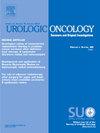Efficacy and safety of dose-dense gemcitabine and cisplatin as neoadjuvant chemotherapy for high-grade upper tract urothelial carcinoma (cT2-3N0M0)
IF 2.4
3区 医学
Q3 ONCOLOGY
Urologic Oncology-seminars and Original Investigations
Pub Date : 2025-03-03
DOI:10.1016/j.urolonc.2025.02.010
引用次数: 0
Abstract
Purpose
Neoadjuvant chemotherapy for upper tract urothelial carcinoma has shown favorable results. However, few studies have been conducted on dose-dense regimens that have demonstrated superior efficacy in bladder cancer. We aimed to retrospectively evaluate the efficacy and safety of dose-dense gemcitabine and cisplatin as neoadjuvant chemotherapy for upper tract urothelial carcinoma.
Materials and Methods
Ninety-five patients who underwent radical nephroureterectomy for high-grade upper tract urothelial carcinoma (cT2-3N0M0) with dose-dense gemcitabine and cisplatin (n = 33) or without neoadjuvant chemotherapy (n = 62, Control) were included. Propensity score matching was performed based on the patient and tumor demographics. Efficacy was evaluated by the pathological response rate defined as pathological downstaging to ≤ pT1N0 and complete response (pT0N0). Progression-free survival, cancer-specific survival, and overall survival were estimated. All adverse events and postoperative complications were assessed.
Results
Thirty-one matched patients were included in each cohort after adjusting for baseline propensity score matching. The pathological downstaging to ≤ pT1N0 rate of the neoadjuvant chemotherapy group was significantly higher than the Control group. The complete response rate was 6.5% in the neoadjuvant chemotherapy group; pT0N0 was not observed in the Control group. The 2-year progression-free survival and cancer-specific survival rates were significantly better in the neoadjuvant chemotherapy group. Of the 33 patients who received neoadjuvant chemotherapy, 7 severe adverse events (grade 3 or higher) were observed in 6 patients.
Conclusions
Dose-dense gemcitabine and cisplatin showed a favorable pathological response and oncological outcome with good tolerability.
剂量密集吉西他滨和顺铂作为高级别上尿路上皮癌(cT2-3N0M0)新辅助化疗的有效性和安全性。
目的:新辅助化疗治疗上尿路上皮癌已显示出良好的效果。然而,很少有研究表明剂量密集方案对膀胱癌有优越的疗效。我们旨在回顾性评价剂量密集的吉西他滨和顺铂作为上路尿路上皮癌新辅助化疗的有效性和安全性。材料和方法:纳入95例接受根治性肾输尿管切除术的高级别上尿路上皮癌(cT2-3N0M0)患者,这些患者采用剂量密集的吉西他滨和顺铂(n = 33)或未进行新辅助化疗(n = 62,对照组)。根据患者和肿瘤的人口统计学特征进行倾向评分匹配。以病理降期≤pT1N0和完全缓解(pT0N0)的病理缓解率评价疗效。评估无进展生存期、癌症特异性生存期和总生存期。评估所有不良事件和术后并发症。结果:在调整基线倾向评分匹配后,每个队列纳入31名匹配患者。新辅助化疗组病理降期至≤pT1N0率明显高于对照组。新辅助化疗组完全缓解率为6.5%;对照组未见pT0N0。新辅助化疗组2年无进展生存率和肿瘤特异性生存率均显著提高。在33例接受新辅助化疗的患者中,6例患者出现7例严重不良事件(3级及以上)。结论:剂量密集的吉西他滨和顺铂表现出良好的病理反应和肿瘤预后,耐受性良好。
本文章由计算机程序翻译,如有差异,请以英文原文为准。
求助全文
约1分钟内获得全文
求助全文
来源期刊
CiteScore
4.80
自引率
3.70%
发文量
297
审稿时长
7.6 weeks
期刊介绍:
Urologic Oncology: Seminars and Original Investigations is the official journal of the Society of Urologic Oncology. The journal publishes practical, timely, and relevant clinical and basic science research articles which address any aspect of urologic oncology. Each issue comprises original research, news and topics, survey articles providing short commentaries on other important articles in the urologic oncology literature, and reviews including an in-depth Seminar examining a specific clinical dilemma. The journal periodically publishes supplement issues devoted to areas of current interest to the urologic oncology community. Articles published are of interest to researchers and the clinicians involved in the practice of urologic oncology including urologists, oncologists, and radiologists.

 求助内容:
求助内容: 应助结果提醒方式:
应助结果提醒方式:


